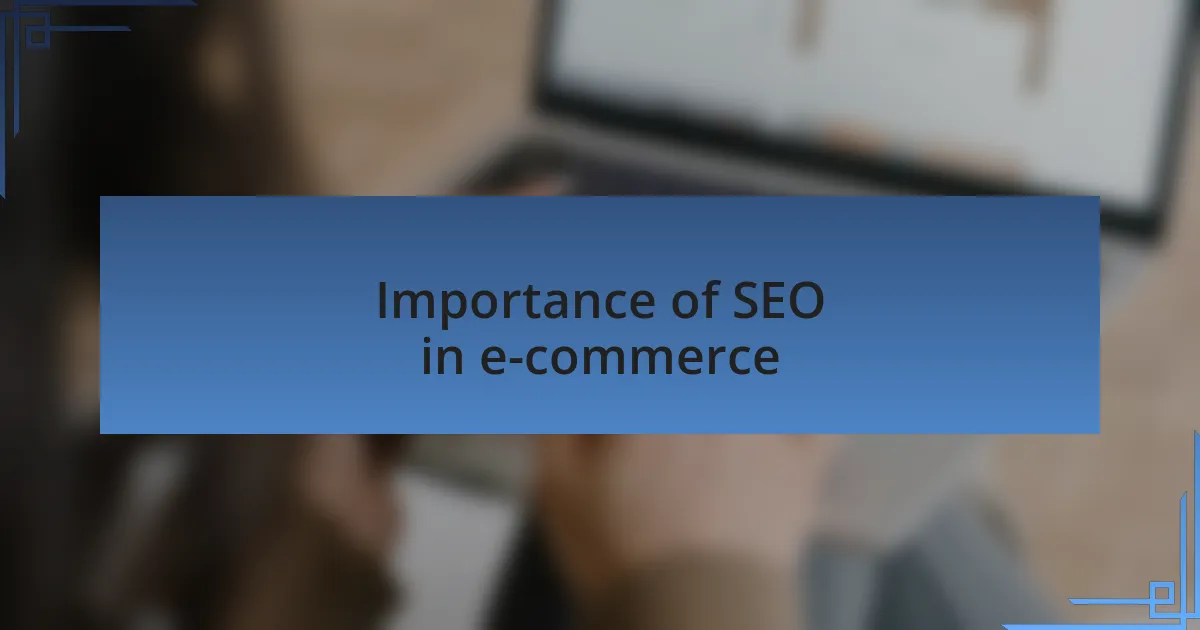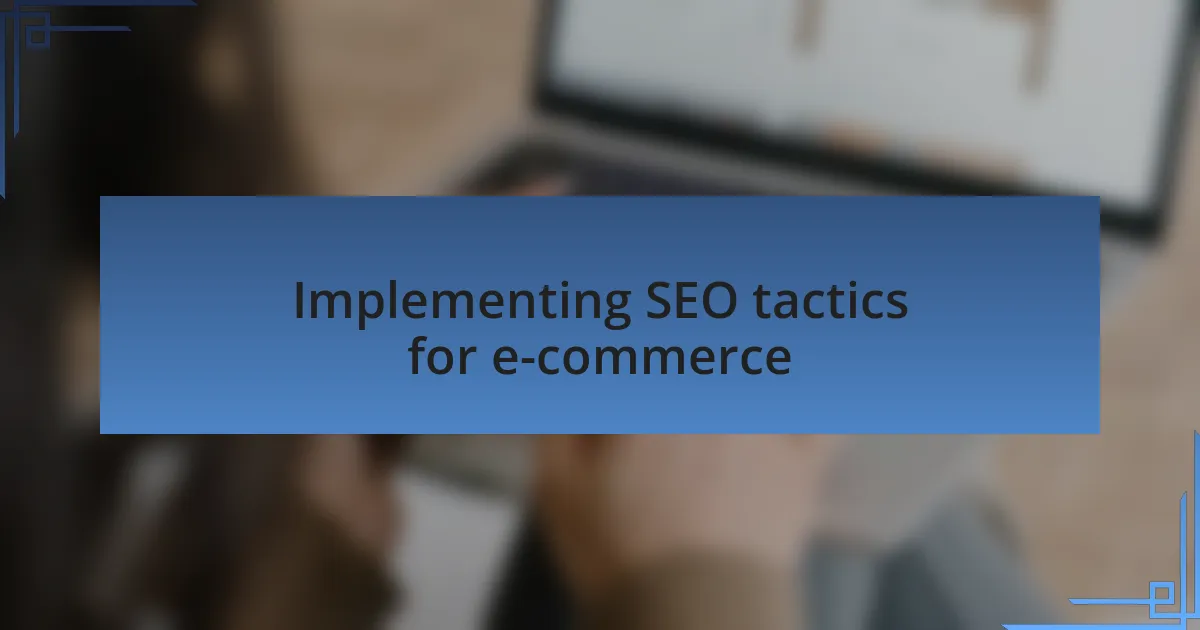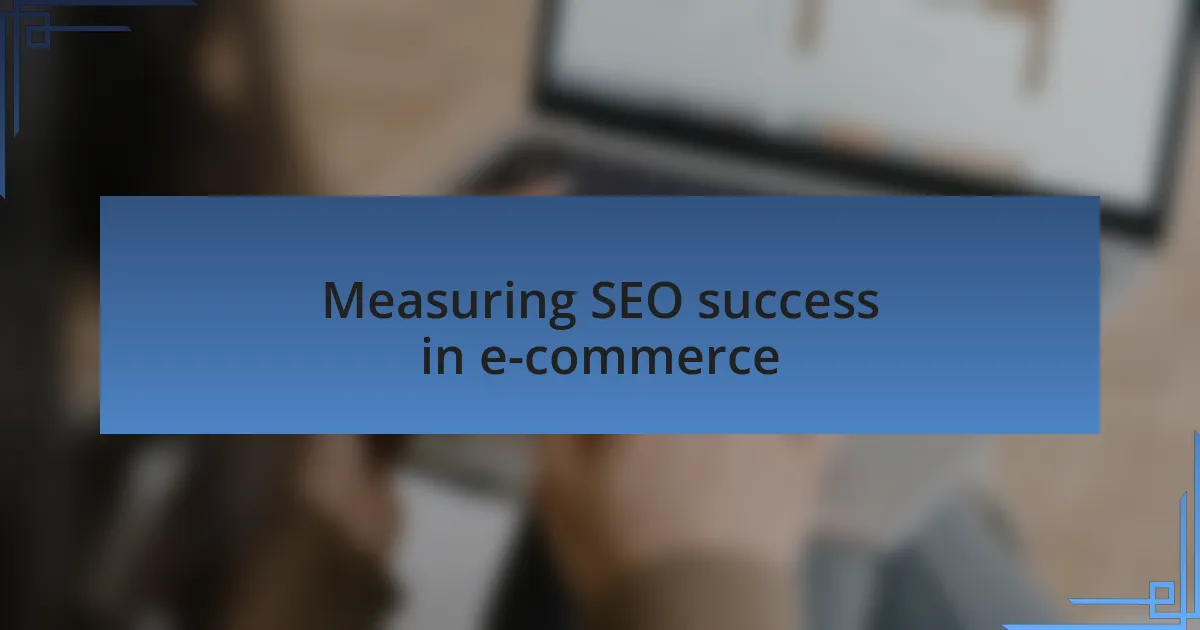Key takeaways:
- A digital marketing agency bridges businesses and their target audiences, offering tailored strategies that adapt to trends and real-time data.
- SEO optimizes e-commerce visibility, with keyword research and user experience being crucial factors in driving traffic and conversions.
- Implementing effective SEO tactics, such as on-page optimization and backlinking, enhances credibility and attracts engaged audiences.
- Measuring SEO success through organic traffic, conversion rates, and keyword rankings enables businesses to refine strategies and better meet customer needs.

Digital marketing agency overview
A digital marketing agency serves as a bridge between businesses and their target audiences in the ever-evolving online landscape. I remember when I first engaged with a digital marketing agency; the sheer volume of strategies available was overwhelming, yet the agency made it feel like a personalized journey. Their expertise transformed my vague ideas into concrete action plans that drove results.
What I find particularly fascinating about these agencies is their ability to adapt to trends and technologies that change seemingly overnight. Have you ever wondered how businesses keep their online presence fresh and relevant? I’ve seen firsthand how a well-configured agency can monitor analytics and pivot strategies based on real-time data, ensuring that brands remain competitive and impactful.
Moreover, the collaborative approach taken by a digital marketing agency fosters a sense of partnership. I’ll never forget the late-night strategy sessions filled with brainstorming ideas and uncovering unique opportunities for growth. This emotional investment not only fuels creative ideas but also cultivates a genuine connection between the agency and the business, ultimately leading to shared success.

Importance of SEO in e-commerce
Optimizing an e-commerce site for search engines can be a game-changer. From my own experience, I remember launching a product only to find that, despite its exceptional quality, it got lost in the vast digital marketplace. Implementing strong SEO practices helped that product finally surface in search results, making it accessible to customers who actually valued what it offered.
I often see e-commerce businesses underestimating the importance of keyword research. Just a couple of well-researched keywords can significantly enhance visibility online. When I focused on the right terms, I stumbled upon inquiries from potential customers that I wasn’t even aware existed. This not only drove traffic but also opened avenues for meaningful engagement with my audience.
Moreover, SEO isn’t just about the content on a page; it’s about creating a holistic experience that keeps users engaged. For instance, I learned that improving page load time and mobile-friendliness dramatically influenced user satisfaction. How frustrating is it to click on a promising link only to be met with a sluggish page? I realized that optimizing for user experience ultimately leads to higher conversion rates—transforming casual visitors into loyal customers.

Implementing SEO tactics for e-commerce
When implementing SEO tactics for e-commerce, I’ve found that on-page optimization is crucial. Fine-tuning product descriptions with relevant keywords not only helps search engines understand the context better but also engages customers. I remember taking a simple product page and rewriting it with a focus on both SEO and storytelling. The result? A boost in organic traffic and a palpable increase in customer interest.
Another essential tactic is utilizing long-tail keywords. They may seem less popular, but I personally discovered their power when targeting very specific searches. Once, I focused on a niche phrase that drew in an enthusiastic audience who genuinely connected with what I offered. It taught me that in the world of e-commerce, precision often trumps volume, creating a loyal community around my products.
Finally, I’m a firm believer in the importance of backlinking for credibility. I took the time to build relationships with industry bloggers and sought guest blog opportunities. This not only improved my site’s authority but also introduced my brand to their audiences. Does it work? You bet it does! Seeing traffic from those backlinks genuinely boosted my confidence and expanded my reach beyond my wildest expectations.

Measuring SEO success in e-commerce
Measuring SEO success in e-commerce can sometimes feel like searching for a needle in a haystack, but I’ve come to rely on key metrics that paint a clear picture. One measure I track closely is organic traffic. When I first started, seeing growth in visitors from search engines felt like validation—it was proof my efforts were paying off. Watching those numbers climb week after week not only fueled my motivation but also influenced my overall strategy.
Another vital indicator is conversion rates. Initially, I overlooked this aspect, thinking traffic alone was enough. I remember the moment I realized that while traffic was essential, turning those visitors into customers was the ultimate goal. Adjusting my approach by analyzing which pages led to higher conversions taught me to adapt my SEO tactics based on real user behavior. It’s eye-opening to see how tweaks in content or layout can dramatically affect purchase decisions.
Finally, I’ve found tracking keyword rankings to be essential. When I first optimized my site, I was ecstatic to see my primary keywords move up the search results. It’s not just about ranking high; I’ve learned that understanding the keywords your customers use can lead to deeper insights into their needs and motivations. Have you ever noticed a slight change in a keyword’s position? That small shift can be a game-changer, prompting me to revisit my strategy and refine it further.

Personalizing your e-commerce SEO approach
Personalizing your e-commerce SEO approach starts with knowing your audience deeply. I remember launching a new product line and diving into the data to understand who was buying it. It was fascinating to uncover that our typical customers had specific interests and demographics, which guided me in tailoring our content and keywords specifically for them. Have you taken the time to segment your audience? This can lead to a more customized strategy that resonates personally with potential buyers.
Incorporating user-generated content has also been a game-changer for my SEO efforts. When I decided to feature customer reviews and testimonials prominently on our site, the impact on our search rankings was immediate. It’s rewarding to see genuine customer voices not only boost credibility but also enhance relevance in search engines. Do you ever consider how your customers can contribute to your strategy? Engaging with them through their experiences creates a community that strengthens both loyalty and your SEO.
Lastly, I always test and adapt my strategies based on actual performance. For example, when I revamped our product descriptions by weaving in stories from customers’ experiences, I noticed a significant uptick in engagement and sales. This trial-and-error aspect of SEO is invigorating; it’s like piecing together a puzzle. Have you embraced the flexibility in your approach? Personalizing your e-commerce SEO isn’t just about aligning keywords; it’s truly about connecting with the heart of your audience.